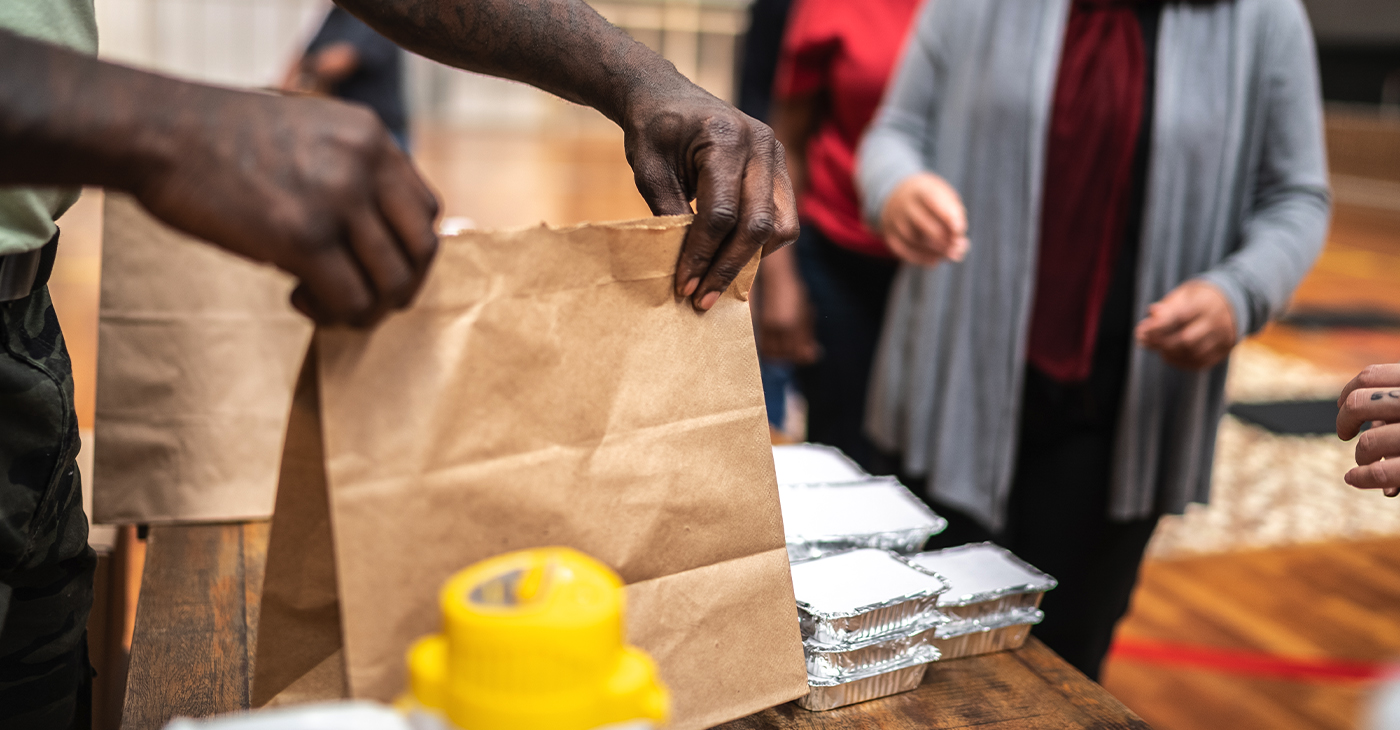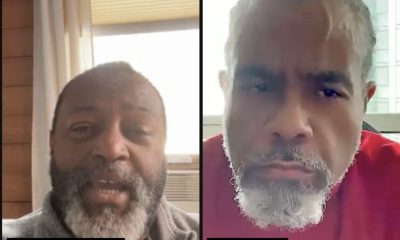By Barrington M. Salmon
NNPA Newswire
Food security advocates, policymakers, and others had been warning of the dire consequences to those most in need if Congress chose to halt the extra allotments of SNAP benefits. Still, the Republican-led House let the COVID-era supplemental payments wind down at the end of February.
Those closest to the problem say the consequences are already evident in the days since the extra allotments ended. The issues of hunger and food insecurity are being pushed to the forefront of the nation’s myriad challenges. The abrupt benefit cuts are estimated to affect more than 30 million people in 35 states.
On the frontlines, activists fighting the twin scourges of hunger and homelessness, like Anne Miskey, Kymone T. Freeman and Daniel del Pielago, contend that this and other crises were avoidable. Still, Congress, other elected officials, and society at large lack the political will or the compassion to eliminate what is essentially a man-made problem.
“Yet, although the SNAP extra allotments, stimulus funds and other assistance from the federal government helped stave off hunger and homelessness during the COVID crisis,” Kymone T. Freeman said, “the politicians have inexplicably allowed a critical lifeline to expire.”
Freeman said politicians are more concerned about staying in office and catering to the donor class and the wealthy instead of focusing on and delivering programs, projects and policies to working and middle-class Americans, particularly African Americans.
“This sounds like more austerity to me. The fact that they are cutting anything now is obscene and immoral. All it means is more hardship for the poor,” said Freeman, a social justice activist, playwright, and co-founder of WEACT Radio in Washington, DC. “This will increase crime, poverty, distress and misery. The cuts are contributing to hunger. Thirty percent of the children in Washington, DC, live in poverty. A budget is a moral document, and this is where their morality lies.”
Miskey, executive director of Union Station Homeless Services in Los Angeles, California, agreed.
“Much of the inflation and high prices we’re seeing is because of corporate greed. We’re expecting homelessness to skyrocket,” Miskey said. “During COVID, we rented all these hotels and shelters. We managed pretty well during COVID as local, state, and federal money poured in. But with the funding money gone, we’re trying to figure things out. The cost of living, rent, and evictions are going up. The cost of living is driving people into homelessness. Things are going to get pretty bad because of the cost of living.”
Miskey contends that separating food insecurity from gentrification, low wages, displacement, and homelessness is impossible. “COVID-19 has laid bare the structural, institutional, economic, and racial inequities that separate African Americans, Latinos, and Native Americans from their white counterparts,” she said. Marginalized communities have been hit particularly hard by many challenges, many not naturally occurring.
“Healthcare workers, people of color, and immigrants are making horrible wages,” Miskey said. “They cannot afford afterschool care for kids, don’t have money for affordable housing, and struggle to make ends meet. This is a war against the poor. They tell people that they did this to themselves. Millions of people have no opportunity or are intentionally excluded from opportunities. Racism is the #1 factor for excluding people.”
The SNAP emergency allotments were designed to alleviate food insecurity and stimulate the US economy throughout the COVID pandemic public health emergency. According to DC Hunger Solutions, the cuts to SNAP benefits will affect more than 90,000 people in the District of Columbia. On average, when this “hunger cliff” hits, each SNAP participant will lose over $90 a month, DC Hunger Solutions officials explained on the website.
“As a result, average SNAP benefits will fall to a meager $6 a person a day. The “hunger cliff” will hit all age groups and all parts of the District of Columbia. The steepest cliff will be for many older adults who only qualify for the minimum SNAP benefit — dropping from $281 a month to $30,” staff said.
The “hunger cliff” — a perfect storm of a striking reduction of benefits in the face of high inflation and climbing grocery costs — will exacerbate food insecurity and hardship in the District of Columbia and elsewhere. The District will lose more than $14 million in benefits monthly. Emergency food providers can’t fill this gap. Even before the cuts, food banks, pantries, and soup kitchens have reported high demand for assistance, DC Hunger Solutions said.
All over America, Miskey said, people are vulnerable, have health problems, are aging, have been homeless for a long time, including seniors.
“It doesn’t take much: a single income, losing a spouse, an increase in the cost of housing. People are precariously housed. People have to put themselves in danger sometimes,” said Miskey. “People are stealing to survive. People need help, but needing help is seen as something weak or bad. Of course, the Republican Party sells the lottery mentality. People figure they’re going to be up there one day and dream that they’re going to get there.”
Daniel del Pielago agrees with Miskey that Republicans and others who support their ideas and agenda are committed to former President Donald Trump’s promise to dismantle the administrative state.
Del Pielago, organizing director of Empower DC, said these cuts and Republican plans to disembowel the social safety net — including Medicare and social security — is a deliberate policy choice aimed directly at the working class, low-income households, and the poor in this country.
“It’s part of this onslaught of safety net services being cut. I just heard from the city that they’re cutting the Emergency Rental Program 6½ months earlier than expected. And rents in May will go up 8.9% here in the District,” del Pielago said. “DC is super expensive, there are no livable wages for a certain population segment and there’s a sustained attack on low-income people. What we’re seeing in terms of the onslaught is the Trump effect coming into play. We have a bunch of people making these decisions which don’t benefit low-income residents and Black people. They were attempting, and now they’re having success.”
Miskey said as she views the challenges and devastation food insecurity has wrought on poor, near-poor, low-income, and middle-class Americans, she feels anger and frustration because most of this is and was avoidable.
“I think our systems have massively failed people,” she said. “I shouldn’t say that. I don’t think our system has failed. I think our system was set up to fail. They are set up to keep up the status quo, ensuring that those people of privilege and wealth maintain their privilege and wealth.”
Meanwhile, everyone else is blamed for their supposed character defects or failures because supposedly all the opportunities are out there if you grab them, Miskey explained.
“The fact is, our system creates massive barriers for opportunity and doesn’t allow huge chunks of our communities to actually access those things. That’s the shame of our system, the shame of our government. As I said before, we’re a system where we have a war on the poor, not a war on poverty.”
Matthew Desmond, a Princeton University sociologist and the director of the university’s Eviction Lab, said America has a poverty problem, and poverty and food insecurity are deeply intertwined.
“Poverty is measured at different income levels, but it is experienced as an exhausting piling on of problems. Poverty is chronic pain, on top of tooth rot, on top of debt collector harassment, on top of the nauseating fear of eviction,” said Desmond. “It is the suffocation of your talents and your dreams. It is death that comes early and often. From 2001 to 2014, the richest women in America gained almost three years of life while the poorest gained just 15 days. Far from a line, poverty is a tight knot of humiliations and agonies, and its persistence in American life should shame us.”
Desmond said housing assistance and food stamp programs are “effective and essential, protecting millions of families from hunger and homelessness each year,” he said in a March 16 column in the New York Times. “But the United States devotes far fewer resources to these programs, as a share of its gross domestic product, than other rich democracies, which places America in a disgraced class of its own on the world stage.”
That disgrace is illustrated in the stats showing that 33% of Americans live in households making less than $55,000, he said.
“Many are not officially counted among the poor, but there is plenty of economic hardship above the poverty line,” Desmond said. “And plenty far below it as well. According to the Supplemental Poverty Measure, which accounts for government aid and living expenses, more than one in 25 people 65 or older lived in deep poverty in 2021, meaning that they’d have to, at minimum, double their incomes just to reach the poverty line.”
He said Americans must commit to becoming poverty abolitionists to break this cycle.
“Like abolitionist movements against slavery or mass incarceration, abolitionism views poverty not as a routine or inevitable social ill but as an abomination that can no longer be tolerated,” he said. “And poverty abolitionism shares with other abolitionist movements the conviction that profiting from another’s pain corrupts us all. Ending poverty in America will require both short- and long-term solutions: strategies that stem the bleeding now, alongside more enduring interventions that target the disease and don’t just treat the symptoms.”
This includes appropriately addressing the housing crisis, which forces most poor renting families to devote at least 50% of their income to rent and utilities; immediately expanding housing vouchers to reduce the rent burden; pushing for “more transformative solutions” like scaling up the country’s public housing infrastructure; building out community land banks; and providing on-ramps to homeownership for low-income families.



 Activism4 weeks ago
Activism4 weeks ago
 Activism4 weeks ago
Activism4 weeks ago
 Alameda County4 weeks ago
Alameda County4 weeks ago
 Activism4 weeks ago
Activism4 weeks ago
 Alameda County4 weeks ago
Alameda County4 weeks ago
 Activism4 weeks ago
Activism4 weeks ago
 Activism4 weeks ago
Activism4 weeks ago
 Activism3 weeks ago
Activism3 weeks ago


















































